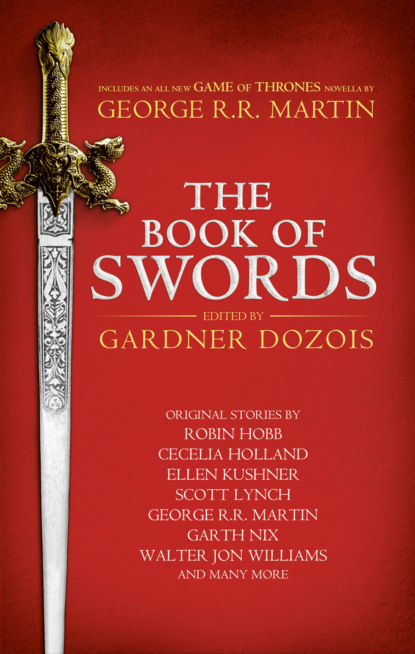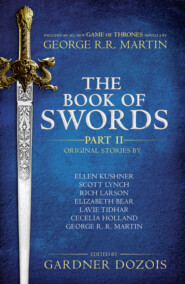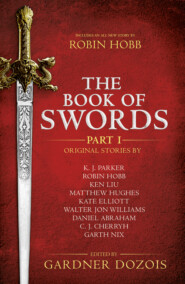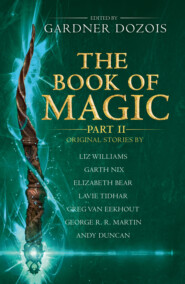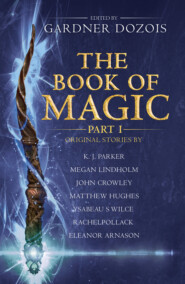По всем вопросам обращайтесь на: info@litportal.ru
(©) 2003-2024.
✖
The Book of Swords
Автор
Год написания книги
2018
Настройки чтения
Размер шрифта
Высота строк
Поля
Once you’ve learned footwork, the rest is relatively easy. I taught him the eight cuts and the seven wards (I stick to seven; the other four are just elaborations). He picked them up quickly, now that he understood the essence—don’t let him hurt you, followed by make him safe.
“The best way to make a man safe,” I told him, “is to hurt him. Pain will stop him in his tracks. Killing doesn’t always do it. You can stab a man and he’ll be past all hope, but he can still hurt you very badly before he drops to the ground. But if you paralyse him with pain, he’s no longer a threat. You can then despatch him, or let him go, at your pleasure.”
I demonstrated; I flicked past his guard and prodded him in the stomach with my rake-handle; a lethal thrust, but he was still on his feet. Then I cracked him on the knee, and he dropped. “Killing’s irrelevant,” I told him. “Pain wins fights. That’s unless you’ve absolutely set your heart on cleaving him to the navel, and that’s just melodrama, which will get you killed. In a battle, hurt him and move on to the next threat. In a duel, win and be merciful. Fewer legal problems that way.”
I was rather enjoying being a teacher, as you’ve probably gathered. I was passing on valuable knowledge and skill, which is in itself rewarding, I was showing off and I was hitting an annoying sprig of the nobility for his own good. What’s not to like?
You learn best when you’re exhausted, desperate, and in pain. Ultramar taught me that. I kept him at it from dawn till dusk, and then we lit the lamp and did theory. I taught him the line and the circle. Instinctively you want to fight up and down a line, forwards to attack, backwards to defend; parry, then lunge, then parry. All wrong. Idiotic. Instead, you should fight in a circle, stepping sideways, so you avoid him and can hit him at the same time. Never just defend; always counterattack. Every handstroke you make should be a killing stroke, or a stopping stroke. And for every movement of the hand, a movement of the foot—there, I’ve just taught you the whole secret and mystery of swordsmanship, and I never had to hit you once.
“Most fights,” I told him, giving him a chance to wipe the blood out of his eyes before we moved on, “in which at least one party is competent, last one to four seconds. Anything more than that is a fitting subject for epic poetry.” Judging that he wasn’t ready yet, I shot a quick mandiritto at the side of his head. He stepped back and left out of the way without thinking, and my heart rejoiced inside me, as I side-stepped his riposte in straight time and closed the door with the Third ward. So far he hadn’t hit me once, which was a little disappointing; but he’d come close four times, in six hours. Very promising indeed. He just lacked the killer instinct.
“The Fifth ward,” I went on, and he lunged. I almost didn’t read it, because he’d disguised the Boar’s Tooth as the Iron Gate; all I could do was trace back very fast and smack the stick out of his hands. Then I whacked him, for interrupting me when I was talking. He very nearly got out of the way, but I wanted to hit him, so he couldn’t.
He had to pick himself up off the ground after that. I took a long step back, to signal a truce. “I think it’s time for a progress report,” I said. “At the moment, you’re very good indeed. Not the best in the world, but more than capable of beating ninety-nine men in a hundred. Would you like to stop there and save yourself further pain and humiliation?”
He got up slowly and dabbed at his cut eye. “I want to be the best,” he said. “If that’s all right.”
I shrugged. “I don’t think you ever can be,” I told him. “In order to be the best, you have to lose so much. It’s just not worth it. Being the best will make you into a monster. Stick with just plain good, you’ll be so much happier.”
He was a pitiful sight, all cuts and bruises. But still, under all the blood and discoloured tissue, a hopeful, pretty boy. “I think I’d like to carry on just a bit longer if you don’t mind.”
“Please yourself,” I said, and let him pick up his stick.
Actually, he reminded me a lot of myself at his age.
I was a brash, irritating boy when I went to Ultramar. I’d known all along that I wasn’t going to get the land, having elder brothers in good health. Probably I’d always resented that. I think I’d have made a good farmer. I was always the one who wasn’t afraid of hard work, who saw the need to get things done—not tomorrow, or when we’ve got five minutes, or when it stops raining, but now, right now; before the roof-tree breaks and the barn falls down, before the fence-posts snap off and the sheep get out into the marsh, before the oats spoil on the stalk, before the meat goes off in the heat; now while there’s still time, before it’s too late. Instead, I saw the place gradually falling to pieces—and decline and decay are so peacefully gradual; grass takes so long to grow up through the cobbles, it’s imperceptible, therefore not threatening. But my father and my brothers didn’t share my view. I was keen to get away from them. I wanted to take a sword and slice myself a fat chunk of the world off the bone. There’s good land in Ultramar, they told me, all it needs is a bit of hard work and it could be the best in the world.
The very best; that’s a concept that’s danced ahead of me, just out of reach, all my life. Now, of course, I am the very best, at one small corner of one specific craft. I’m stuck, wedged in by my own pre-eminence, like a rafter lying across your leg in a burning house.
But never mind; I went to Ultramar aiming to be a farmer. When I got there, I found what was left after seventy years of continual reciprocal chevauchees. I recognised it at once. It was what was going to happen to my father’s land back home, but in macrocosm. All the barns fallen, all the fences broken down, all the crops spoilt, briars and nettles neck-high in all the good pastures; the effects of peace and idleness accelerated and forced (like you force early crops, under straw) by the merely instrumental action of the wars. Cut myself off a slice of that, I said to myself; why the hell would I want to bother? So I started hurting people instead.
And the thing is, if you do it in war, they praise you for it. Strange, but true.
In war, there’s so much scope, you can afford to be selective. You can afford to limit yourself to hurting the enemy, of whom there are plenty to go round, and twice as many again once you’ve finished what’s on your plate. I survived in Ultramar because I was having the time of my life, for a while.
Odd thing about farmers; they love their land and their stock and their buildings, fences, trees, but give them the chance to wreck someone else’s land, kill their stock, burn their buildings, smash their fences, maim their trees, and after a brief show of reluctance they go to it with a will. I think it’s just basic revenge; take that, agriculture, that’ll learn you. Volunteers for a chevauchee? My hand was up before I had time to think.
And then I did something bad, and I had to come home. I cried when they pronounced sentence. I despise men who cry. They told me I was to be spared the noose in recognition of my years of valiant and honourable service. I don’t think so. I think they were just being very, very spiteful.
There came a moment, very sudden and unexpected, when it was over, and I’d succeeded. I went to smack him—a feint high followed by a cut low—and he simply wasn’t there to be hit; and then my ear stung horribly, and while I was confused and distracted by the pain, he dug me in the pit of the stomach with his broom-handle.
He wasn’t like me. He took a long step back and let me recover. “I’m sorry,” he said.
It took me quite awhile to get back enough breath to say, “No, don’t apologise, whatever you do.” Then I squared up into First. “Again.”
“Really?”
“Don’t be so bloody stupid. Again.”
I let him come at me, because attacking is so much harder. I read him like a book, swung easily into a traverse and the devastating volte, my speciality; and he cracked me on the elbow as I floundered past him, then prodded me in the small of the back, just before I overbalanced and fell over.
He helped me up. “I think I’m starting to get the hang of this,” he said.
I went for him. I wanted to beat him, more than I’ve ever wanted anything. I couldn’t get anywhere near him, and he kept hitting me, gently, just to make a point. After a dozen or so passes, I dropped to my knees. All my strength had drained out of me, as though one of his gentle prods had punctured right to my heart. “I give up,” I said. “You win.”
He was looking down at me with a sort of confused frown. “I don’t follow.”
“You’ve beaten me,” I said. “You’re now the better man.”
“Really?”
“What do you want, a bloody certificate? Yes.”
He nodded slowly. “Which makes you the best ever teacher,” he said. “Thank you.”
I threw away the rake-handle. “You’re welcome,” I said. “Now go away. We’re finished with each other.”
He was still looking at me. “So am I really the best swordsman in the world?”
I laughed. “I don’t know about that,” I said, “but you’re better than me. That makes you very good indeed. I hope you’re satisfied because as far as I’m concerned, this has been a pretty pointless exercise.”
“No,” he said, and his tone of voice made me look at him. “This was all for a purpose, remember.”
Actually, I’d forgotten, briefly. “Oh yes,” I said, “it’s so you can kill the man who murdered your father.” I shook my head. “You still want to do that.”
“Oh yes.”
I sighed. “I’d hoped I might have smacked some sense into you,” I said. “Come on, you must’ve learned something. Think about it. What’s that possibly going to achieve?”
“It’ll make me feel better,” he said.
“Right. I don’t think so. I’ve killed God knows how many people, all of them the enemy, and believe me, it never makes you feel better. It just hardens you, like forging the edges.”
He grinned. “And hard is brittle, yes, I know. The extended metaphor hasn’t been lost on me, I assure you.”
It didn’t hurt quite so much by then, and I was breathing almost normally. “Well,” I said, “I guess it’s something you’ve got to get out of your system, then you can get on with your life. You carry on, and good luck to you.”
He smiled at me, awkwardly. “So I have your blessing, then?”
“That’s a bloody stupid way of putting it, but if you want to, then yes. My blessing goes with you, my son. There, is that what you wanted?”
He laughed. “As a father you have been to me, for a little while.” It was a quotation from somewhere, though I can’t place it. “You think I can beat him?”
“I don’t see why not.”
“Neither do I,” he said. “It’s always easier the second time.”
Now I’m not particularly slow on the uptake, not usually. But I admit, it took me a moment. And in that moment, he said, “You never asked my name.”





